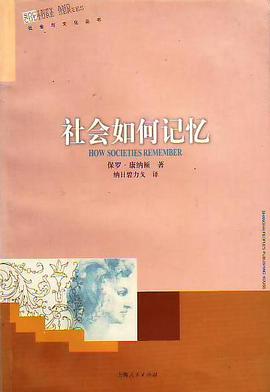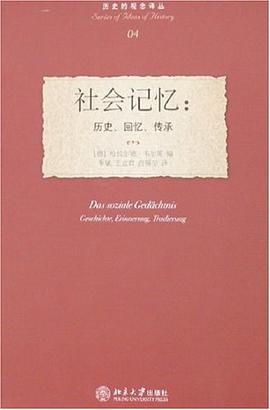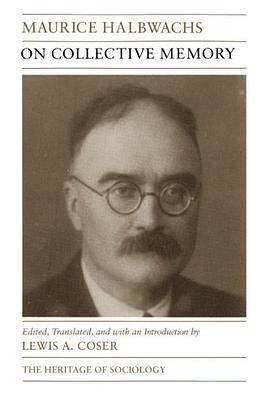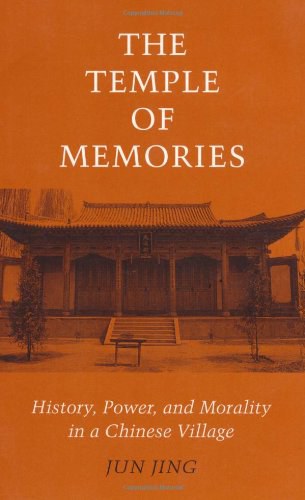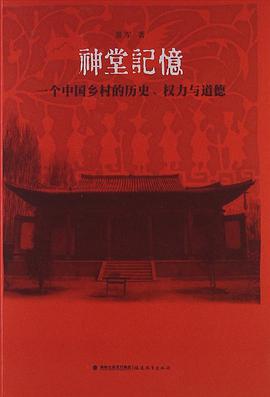集体记忆
社会记忆 豆瓣
Das soziale Gedächtnis: Geschichte, Erinnerung, Tradierung
作者:
哈拉尔德·韦尔策
译者:
季斌
/
王立君
…
北京大学出版社
2007
- 5
人的经验是可以跨代传递的,建筑、景色、声响、气味和触觉印象等等本身也承载着历史和回忆。回忆是如何进行的,是如何传承的?在此过程中,日常的象征性和社会性实践起到什么样的作用?
记忆问题的研究,在西方学界已经有二十多年的探索。本书是来自历史学、传播学、社会心理学和神经心理学等学科的国际学者跨学科合作的成果,历史和回忆之间的复杂关系是本书研讨的核心,他们提出了“社会记忆”这一概念,作为对文化记忆和沟通记忆的补充,集中研讨了无意图地传承历史的形式和实践。
作者们初次尝试提供一种有关“社会记忆”的理论,为考察进行回忆和忘却的社会组织打开了一个崭新的视角。
记忆问题的研究,在西方学界已经有二十多年的探索。本书是来自历史学、传播学、社会心理学和神经心理学等学科的国际学者跨学科合作的成果,历史和回忆之间的复杂关系是本书研讨的核心,他们提出了“社会记忆”这一概念,作为对文化记忆和沟通记忆的补充,集中研讨了无意图地传承历史的形式和实践。
作者们初次尝试提供一种有关“社会记忆”的理论,为考察进行回忆和忘却的社会组织打开了一个崭新的视角。
On Collective Memory 豆瓣
作者:
Maurice Halbwachs
译者:
Lewis A. Coser
University Of Chicago Press
1992
- 9
How do we use our mental images of the present to reconstruct
our past? Maurice Halbwachs (1877-1945) addressed this
question for the first time in his work on collective memory,
which established him as a major figure in the history of
sociology. This volume, the first comprehensive English-
language translation of Halbwach's writings on the social
construction of memory, fills a major gap in the literature
on the sociology of knowledge.
Halbwachs' primary thesis is that human memory can only
function within a collective context. Collective memory,
Halbwachs asserts, is always selective; various groups of
people have different collective memories, which in turn give
rise to different modes of behavior. Halbwachs shows, for
example, how pilgrims to the Holy Land over the centuries
evoked very different images of the events of Jesus' life;
how wealthy old families in France have a memory of the past
that diverges sharply from that of the nouveaux riches; and
how working class constructions of reality differ from those
of their middle-class counterparts.
With a detailed introduction by Lewis A. Coser, this
translation will be an indispensable source for new research
in historical sociology and cultural memory.
Lewis A. Coser is Distinguished Professor of Sociology
Emeritus at the State University of New York and Adjunct
Professor of Sociology at Boston College.
our past? Maurice Halbwachs (1877-1945) addressed this
question for the first time in his work on collective memory,
which established him as a major figure in the history of
sociology. This volume, the first comprehensive English-
language translation of Halbwach's writings on the social
construction of memory, fills a major gap in the literature
on the sociology of knowledge.
Halbwachs' primary thesis is that human memory can only
function within a collective context. Collective memory,
Halbwachs asserts, is always selective; various groups of
people have different collective memories, which in turn give
rise to different modes of behavior. Halbwachs shows, for
example, how pilgrims to the Holy Land over the centuries
evoked very different images of the events of Jesus' life;
how wealthy old families in France have a memory of the past
that diverges sharply from that of the nouveaux riches; and
how working class constructions of reality differ from those
of their middle-class counterparts.
With a detailed introduction by Lewis A. Coser, this
translation will be an indispensable source for new research
in historical sociology and cultural memory.
Lewis A. Coser is Distinguished Professor of Sociology
Emeritus at the State University of New York and Adjunct
Professor of Sociology at Boston College.
The Temple of Memories 豆瓣
作者:
Jun Jing
Stanford University Press
1998
- 10
This study focuses on the politics of memory in the village of Dachuan in northwest China, in which 85 percent of the villagers are sur named Kong and believe themselves to be descendants of Confucius. It recounts both how this proud community was subjected to intense suffering during the Maoist era, culminating in its forcible resettlement in December 1960 to make way for the construction of a major hydroelectric dam, and how the village eventually sought recovery through the commemoration of that suffering and the revival of a redefined religion.
Before 1949, the Kongs had dominated their area because of their political influence, wealth, and, above all, their identification with Confucius, whose precepts underlay so much of the Chinese ethical and political tradition. After the Communists came to power in 1949, these people, as a literal embodiment of the Confucian heritage, became prime targets for Maoist political campaigns attacking the traditional order, from land reform to the “Criticize Confucius” movement. Many villagers were arrested, three were beheaded, and others died in labor camps. When the villagers were forced to hastily abandon their homes and the village temple, they had time to disinter only the bones of their closest family members; the tombs of earlier generations were destroyed by construction workers for the dam.
---------------------------------------------------------------------------------------------
Review
"One of the best local ethnographies to date on post-reform China. . . . Conceptually sophisticated yet undiminished by unnecessary jargon, the book provides one of the most readable and intelligently framed accounts of change and continuity at the local level in China." —Journal of Asian Studies
"Anthropologists and historians will find themselves rewarded by this nuanced examination of social memory, ritual life, and the traumatic recent history of a remarkable village."—China Review International
"This gem of a book takes the study of Chinese village culture to new levels of theoretical sophistication, ethnographic nuance and literary evocativeness. . . . There are many fine books that tell similar stories of the devastation of rural communities during the Maoist era. Dachuan is different only in that the depth of its tragedy was several degrees worse than most. But what makes Jun Jing's book unique is his discovery of a way to probe the meaning of such a history for the villagers."—China Quarterly
"All audiences can enjoy the universal subjects of the book—children and food. . . . Feeding China's Little Emperor's is useful both for anthropologists or those looking at social change over the last few decades."—The China Business Review
"In 1961 the entire village of Dachuan was destroyed when it was submerged under a reservoir created by a newly constructed hydroelectric dam. . . . In Jun Jing's beautifully written account, The Temple of Memories, he reveals how the villagers tra
Before 1949, the Kongs had dominated their area because of their political influence, wealth, and, above all, their identification with Confucius, whose precepts underlay so much of the Chinese ethical and political tradition. After the Communists came to power in 1949, these people, as a literal embodiment of the Confucian heritage, became prime targets for Maoist political campaigns attacking the traditional order, from land reform to the “Criticize Confucius” movement. Many villagers were arrested, three were beheaded, and others died in labor camps. When the villagers were forced to hastily abandon their homes and the village temple, they had time to disinter only the bones of their closest family members; the tombs of earlier generations were destroyed by construction workers for the dam.
---------------------------------------------------------------------------------------------
Review
"One of the best local ethnographies to date on post-reform China. . . . Conceptually sophisticated yet undiminished by unnecessary jargon, the book provides one of the most readable and intelligently framed accounts of change and continuity at the local level in China." —Journal of Asian Studies
"Anthropologists and historians will find themselves rewarded by this nuanced examination of social memory, ritual life, and the traumatic recent history of a remarkable village."—China Review International
"This gem of a book takes the study of Chinese village culture to new levels of theoretical sophistication, ethnographic nuance and literary evocativeness. . . . There are many fine books that tell similar stories of the devastation of rural communities during the Maoist era. Dachuan is different only in that the depth of its tragedy was several degrees worse than most. But what makes Jun Jing's book unique is his discovery of a way to probe the meaning of such a history for the villagers."—China Quarterly
"All audiences can enjoy the universal subjects of the book—children and food. . . . Feeding China's Little Emperor's is useful both for anthropologists or those looking at social change over the last few decades."—The China Business Review
"In 1961 the entire village of Dachuan was destroyed when it was submerged under a reservoir created by a newly constructed hydroelectric dam. . . . In Jun Jing's beautifully written account, The Temple of Memories, he reveals how the villagers tra
